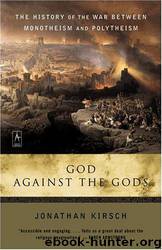God Against the Gods by Jonathan Kirsch

Author:Jonathan Kirsch [Kirsch, Jonathan]
Language: eng
Format: epub
Tags: History
ISBN: 9780142196335
Publisher: Penguin
Published: 2005-01-25T08:00:00+00:00
CHAPTER SEVEN
THE RULER OF THE WHOLE WORLD
The Invention of the Totalitarian State by the First Christian Emperor of Rome
Begin now to cast aside the causes of that disunity which has existed among you, for by so doing, you will with one stroke be acting in the manner most pleasing to the Supreme God, and confer an extraordinary favor on me.
—Constantine to the bishops at the Council of Nicaea
Among the legal petitions, military dispatches and diplomatic notes from all over the ancient world that reached the palace of the Augustus were two letters that had nothing at all to do with affairs of state. Each one was signed by an ardent and eloquent Christian cleric who carefully argued the merits of his case in the arcane theological debate over Arianism that raged within Christianity, and each appealed to Constantine to act as the final arbiter and decide the case in his favor. Thus did the question of the begottenness or unbegottenness of Jesus Christ come to the attention of the man who ruled the Roman empire.
“It were better not to have asked,” replied Constantine, “nor to have answered such questions.”1
Constantine never fully grasped the finer points of the argument that he was called upon to decide one way or the other—but he was quick to understand the dangers of dissent against authority, and he knew well how to go about suppressing it. Indeed, his preference for monotheism over polytheism reflected his own ambition to achieve the same absolute power on earth that the Christian god was believed to exercise in heaven. “The division of the Empire into four sections by Diocletian required four divine patrons for the four rulers,” explains historian Andrew Alfoldi. “The restoration of the unity of the Empire, on the other hand, led inevitably to the belief that a single divine power must watch over the single earthly ruler.”2
“Just as there is only one God, and not two or three or more,” affirms Eusebius, “so there is only one Emperor.”3
Christianity also appealed to Constantine’s preference for order over chaos. Polytheism, as we have seen, empowered every person across the Roman empire to seek spiritual truth from whatever source he or she found most appealing, but the church demanded absolute and unquestioning obedience of everyone who had been admitted to communion. “How could Constantine,” asks Alfoldi, “fail to see the advantages of this unique organization?”4 Constantine had been instructed in the dangers of heresy—a wholly new concept for a lifelong pagan—by the Christian priests who were now among his closest advisers, and he had taken the lessons to heart. “We have received from Divine Providence,” he said of himself, “the supreme favor of being relieved from all error.”5
“The First Totalitarian State in History”
As a ruthless campaigner and an expert intriguer, Constantine was perfectly willing and able to search out and punish anyone who challenged his political authority. Among his innovations, for example, was the establishment of the so-called agentes in rebus, a corps of imperial couriers who served as fixers, enforcers and informers.
Download
This site does not store any files on its server. We only index and link to content provided by other sites. Please contact the content providers to delete copyright contents if any and email us, we'll remove relevant links or contents immediately.
| Africa | Americas |
| Arctic & Antarctica | Asia |
| Australia & Oceania | Europe |
| Middle East | Russia |
| United States | World |
| Ancient Civilizations | Military |
| Historical Study & Educational Resources |
Cecilia; Or, Memoirs of an Heiress — Volume 1 by Fanny Burney(32509)
Cecilia; Or, Memoirs of an Heiress — Volume 2 by Fanny Burney(31920)
Cecilia; Or, Memoirs of an Heiress — Volume 3 by Fanny Burney(31905)
The Secret History by Donna Tartt(18974)
Sapiens: A Brief History of Humankind by Yuval Noah Harari(14335)
Leonardo da Vinci by Walter Isaacson(13253)
The Radium Girls by Kate Moore(11988)
Sapiens by Yuval Noah Harari(5336)
How Democracies Die by Steven Levitsky & Daniel Ziblatt(5186)
The Wind in My Hair by Masih Alinejad(5063)
Homo Deus: A Brief History of Tomorrow by Yuval Noah Harari(4879)
Endurance: Shackleton's Incredible Voyage by Alfred Lansing(4730)
Man's Search for Meaning by Viktor Frankl(4521)
The Silk Roads by Peter Frankopan(4495)
Millionaire: The Philanderer, Gambler, and Duelist Who Invented Modern Finance by Janet Gleeson(4432)
The Rape of Nanking by Iris Chang(4185)
Joan of Arc by Mary Gordon(4069)
The Motorcycle Diaries by Ernesto Che Guevara(4059)
Hitler in Los Angeles by Steven J. Ross(3928)
